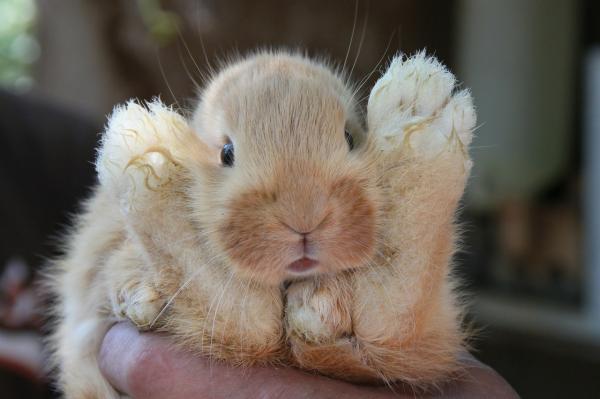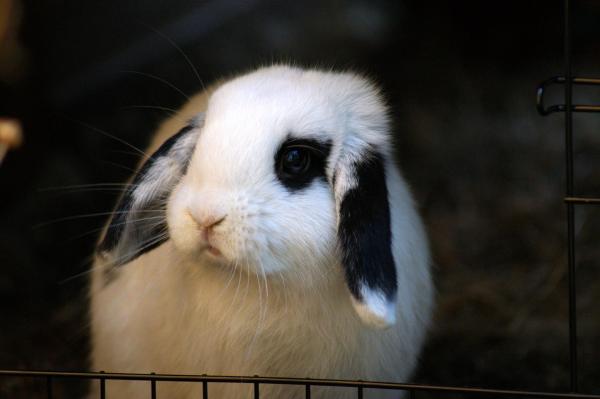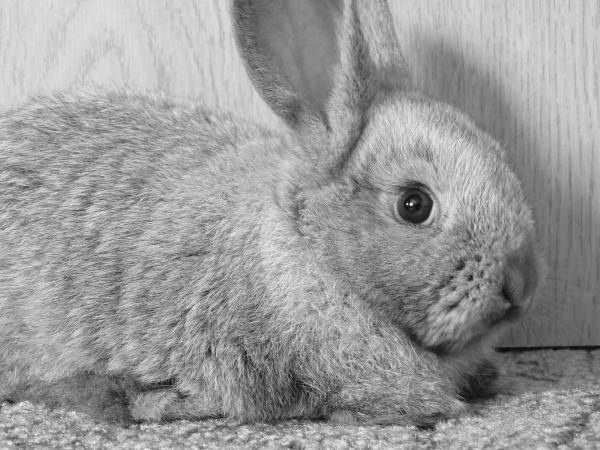
While we think of the popularity of rabbits as pets being a relatively recent phenomenon, there have been organizations dedicated to their rearing for over a century[1]. This increase in popularity has also lead to the need for more veterinarians to become specialized in bunny health. However, the first line of defense against health problems a rabbit may face is their guardian. Rabbit caregivers need to know what is healthy behavior and appearance so they know when to act if a problem does arise.
Gastrointestinal disorders for rabbits can have many causes, but not all of them will provide obvious symptoms. If you see that your rabbit has diarrhea, then this is a sign there is likely some health issue present. AnimalWised looks into what might be the cause of such a problem and whether it is of serious concern.
What to do if my rabbit has diarrhea?
When a rabbit suffers from diarrhea, regardless of the cause, it is likely suffering from something called enteritis. You may have heard it more specifically as gastroenteritis. This is the inflammation of intestinal cells known as enterocytes. Enterocytes are absorptive cells which are essential for the proper assimilation of nutrients. When the cell walls of the intestines are unable to absorb properly, the fecal matter which passes through is affected and leads to overly soft and wet stool, i.e. diarrhea.
As you will read, enteritis is caused by many factors. However, diarrhea can be idiopathic meaning it exists with an unknown cause. Often, diarrhea will be a symptom of a passing condition. It can resolve itself naturally without any intervention. However, it is also a problem which may have a serious cause and there is a mortality rate of between 10 an 20% in affected animals.
The complications associated with diarrhea are also of a concern. Diarrhea is often a symptom of another disease or condition, meaning that treating the underlying pathology will stop the symptom. Diarrhea itself can cause dehydration and malnutrition as too much water is absorbed into the intestinal tract and not enoug nutrients are absorbed out of it.

Causes of diarrhea in rabbits
The causes of diarrhea are diverse, some being infectious and others not. The severity of the diarrhea will depend on the severity of the cause. It is vital if you see that you look at other symptoms when your rabbit has wet stool. Your rabbit may have diarrhea, but is still eating. Others may not be eating at all. Some may have slightly abnormal stools, others may have blood in their stool or have even lost weight.
Color and consistency of the stool are also important. Some may see their rabbit has softer pellets than usual, but the color is the same. Others may see dark green or even black poop in their rabbit, but this doesn't necessarily mean there is a problem. If the stool is watery, then diarrhea is present. We will look into this a little further below.
By observing these other symptoms, we can best determine the original cause. This cause may be:
- Coccidiosis: this is an infectious disease caused by a range of parasites. It mainly affects rabbits which are immunodepressed. This could be bunnies which are very young (during the weaning phase), elderly or are under some other type of duress. These parasites can specifically affect the intestine or liver, but both are a serious illness which manifests diarrhea as a symptom. Diagnosis can be made by looking at the rabbit's stool. The stool may not only be very wet, but it is possible you will see oocysts (spores containing the zygote of the parasite) present. However, this is something which may require a microscopic diagnostic test by a vet[1]. It is treatable, but it is also asymptomatic for a long time which can lead to serious deterioration of a rabbit's health.
- Too much protein: the intestine of a rabbit is colonized by the bacterium Clostridium Spiriforme and Escherichia Coli. However, when the rabbit ingests too much protein, these bacteria have the ability to proliferate to an unhealthy degree and produce a toxin resulting in diarrhea.
- Too little fiber: a rabbit's diet requires a specific balance of nutrients and if they do not have this balance right, health problems arise. If a rabbit has a low intake of fiber, intestinal motility (how it moves along this part of the digestive tract) slows down and feces remains in contact with the intestinal mucosa for an extended period of time. When this is combined with a high intake of carbohydrates, it favors the proliferation of the bacteria mentioned above.
- Antibiotics: lincomycin, penicillin, ampicillin and erythromycin can cause diarrhea in rabbits because they attack very specific bacteria. Germs which are not sensitive to a certain type of antibiotic can proliferate massively since the bacteria which has previously kept them at bay are removed by the antibiotics. In fact “the oral or parenteral administration of lincomycin result in a severe and usually fatal form of diarrhea”[2]. This is why antibiotics need to be prescribed by a qualified veterinarian who knows how to specifically treat rabbits.
- Dietary changes: sudden changes introduced into a rabbit's diet can result in changes to the intestinal flora of the bunny. For all mammals, including humans, the balance of gut flora is essential to well-being and changes can cause serious problems, diarrhea being just one of them. Food forbidden for rabbits can also upset the balance and lead to runny stool.
- Cancer: different types of cancer can affect digestion, resulting in diarrhea in the rabbit. Other symptoms will need to be considered and diagnostic tests are required by the vet.
One of the most common cause of chronic diarrhea in rabbits is something called cecal dysbiosis[3]. This type of diarrhea is intermittent, meaning you will see soft and/or discolored stool as well as the normal healthy stool of a rabbit. This is also caused by an imbalance in intestinal flora, one again showing just how important it is to keep your rabbit hygienic and well fed.

What is unhealthy stool in a rabbit
You will not be able to determine whether a rabbit's poop is unhealthy if you are unaware of what healthy stool should look like. Healthy stool in a rabbit should, generally, take one of two forms:
- Hard feces: a healthy rabbit's stool should be hard and contain traces of hay or other types of fiber essential in their diet. The color of this stool varies from a light brow, almost yellow color to a darker, almost black shade.
- Cecotrope: this is a type of pellet which is produced by lagomorphs (of which rabbits are a part). The original digestive process is not always able to take all the nutrients the rabbit requires from food. These pellets are hard and have a grape-like shape. The rabbit will often re-ingest a cecotrope to get the nutrients it missed the first time round.
While the pellet droppings of a rabbit will not always be the same size, they should be fairly uniform in shape. If the feces is irregularly shaped or too small, then this implies there is some gastrointestinal issue. It may also include hair or fur which the rabbit has ingested for a variety of reasons. The rabbit will have diarrhea if the stool is overly soft, watery and has a foul odor.
You may see your rabbit has a wet tail or have urinated on the ground with red coloring. If this is the case, you may want to look at our article on why a rabbit's urine is red.

Treatment for diarrhea in rabbits
If your rabbit has diarrhea, its treatment will depend on the cause. However, if the diarrhea is acute, it is likely the rabbit will need fluid therapy which may include semi-solid feeding via a syringe. This is because the primary objective is to avoid dehydration and potential starvation due to nutrient deficiency.
Depending on the underlying cause, the following treatments may be used:
- In the case of a diet high in proteins and carbohydrates, but low in fiber, dietary changes should be progressively implemented. An adequate balanced diet should stop diarrhea in the bunny.
- If the vet prescribes antibiotics for the rabbit, we will be likely be advised to prevent side effects by dietary changes and vitamin supplements.
- Fluid therapy will likely be implemented in cases of sudden dietary changes to stabilize intestinal flora. Nutritional supplements may also be required.
- If the diarrhea is caused by coccidiosis, the vet will prescribe an antibiotic from the group of sulfonamides. Additionally, it will be necessary to start semi-solid feeding administered by a syringe.

Tips to prevent diarrhea in rabbits
Preventing diarrhea in rabbits is not always possible, but using some simple hygienic and dietary measures can help give our rabbit the best chance for health and well-being. These include:
- Rabbits should always have a constant supply of hay and fresh water available.
- Their diet will need to be supplemented with high fiber snacks specific for rabbits.
- Keep the bunny's hutch clean and replace their fodder regularly.
- Provide a quiet environment for the rabbit free of loud noises and surprises.
- Dietary changes must be implemented progressively.
- Observe the rabbit daily and keep a specific eye out for changes in physical or behavioral well-being.
This article is purely informative. AnimalWised does not have the authority to prescribe any veterinary treatment or create a diagnosis. We invite you to take your pet to the veterinarian if they are suffering from any condition or pain.
If you want to read similar articles to My Rabbit Has Diarrhea - Causes and Treatment, we recommend you visit our Other health problems category.
1 https://arba.net/about-the-arba/
2 http://agris.fao.org/agris-search/search.do?recordID=IT19780314894
3 https://sawneeanimalclinic.com/downloads/chronic_intermittent_diarrhea_in_rabbits.pdf